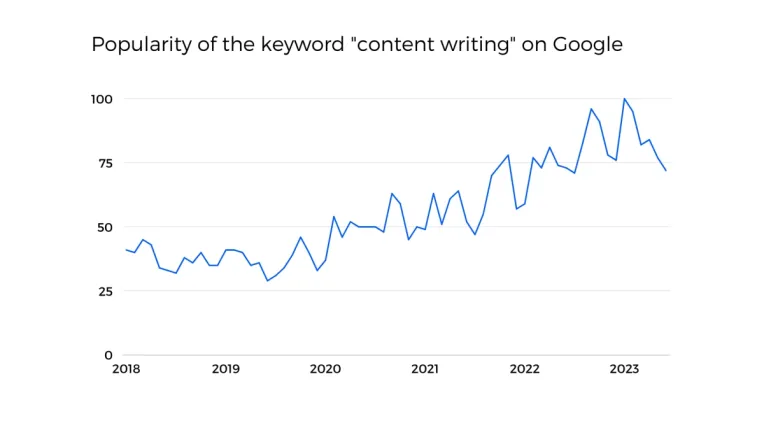Top 6 AI Content Writing Tools for 2025 to Boost Efficiency and Creativity

As a content writer, I understand the daily challenges we face: writer’s block, pressure to create high-quality, SEO-optimized content, and the stress of managing multiple deadlines. Sometimes, it feels like there aren’t enough hours in the day to do it all. But with 2025 comes a new wave of content writing tools designed to make our lives easier. These aren’t just updates to old tools; they’re groundbreaking innovations that will change the way we write, research, and manage content. If you’ve ever wished for an assistant that could help you brainstorm ideas, optimize your SEO, or even suggest the perfect emotional trigger words to captivate your audience, these tools are the answer. In fact, studies show that content writers who leverage AI-powered tools experience a 30-50% boost in productivity. Let’s dive into these top six AI content writing tools for 2025 that will revolutionize your workflow. 6 AI-Powered Content Writing Tools For You to Explore In 2025, AI new content writing tools are reshaping the way we work, alongside existing technologies that continue to streamline our process. These advanced tools are designed to tackle common challenges, like overcoming writer’s block, optimizing content for search engines, and managing multiple projects efficiently. By leveraging these content writing tools, writers can transform their workflow, boost productivity, and focus on crafting engaging and impactful content. 1. ChatGPT How It Helps: ChatGPT, developed by OpenAI, has become an essential tool for content creators. It assists with brainstorming, writing drafts, and even refining content to match the desired tone and style. The latest 2025 version includes enhanced features for real-time collaboration and more accurate content generation. Pain Point Addressed: Writer’s block and lack of inspiration are common struggles. ChatGPT can generate content ideas and provide instant feedback, making the writing process smoother and faster. Statistics: With over 10 million daily users, ChatGPT has become a go-to tool for content creators, with many reporting a 40% increase in productivity. 2. NeuroFlash AI How It Helps: NeuroFlash AI isn’t your typical content writing tool. It leverages neuromarketing techniques to analyze the psychological impact of words and phrases. Whether you’re writing a call to action or an emotional story, NeuroFlash ensures your content connects with readers on a deep, subconscious level. Pain Point Addressed: Ever struggled to write persuasive content that truly converts? NeuroFlash uses psychological data to guide your writing, making your message more compelling and effective. Statistics: According to initial studies, content optimized with NeuroFlash has shown a 20% increase in engagement rates compared to traditional copy. Marketers are already seeing significant improvements in their conversion metrics. 3. INK for All 3.0 How It Helps: INK’s latest version, 3.0, is more than just an SEO tool. It offers predictive performance analytics, allowing writers to see how their content will rank and perform before hitting publish. It’s like having an SEO expert right by your side, offering real-time insights as you write. Pain Point Addressed: SEO can feel like a guessing game, but INK gives you a clear performance score, helping you craft content that ranks and resonates. You’ll never have to wonder if your keyword placement or readability is good enough. Statistics: Users of INK have reported a 35% improvement in organic traffic and a 15% decrease in bounce rates after optimizing their content with this tool. 4. Narrato AI Content Suite How It Helps: Narrato’s AI Content Suite is a dream come true for content teams. It covers the entire content lifecycle: planning, writing, collaborating, and analyzing. It also provides workflow automation and AI writing assistance, perfect for writers juggling multiple projects. Pain Point Addressed: Managing multiple content projects and coordinating with teams can be a logistical nightmare. Narrato streamlines everything, making it easy to keep track of deadlines, content performance, and team collaboration. Statistics: Companies using Narrato have seen a 40% boost in team productivity and report fewer missed deadlines thanks to its integrated project management features. 5. Copy.ai Smart Assistant How It Helps: Copy.ai’s new Smart Assistant for 2025 takes AI content generation to the next level. It uses conversational AI to brainstorm ideas, write drafts, and suggest variations in tone and style. This tool is perfect for those days when you’re stuck staring at a blank screen. Pain Point Addressed: We’ve all been there—struggling to get past the first few lines of a draft. Copy.ai can generate multiple writing samples and ideas, getting your creative juices flowing and making the drafting process a breeze. Statistics: Writers using Copy.ai have reported a 50% reduction in the time spent on first drafts and an improvement in overall writing efficiency. ContentForge 2025 How It Helps: ContentForge 2025 goes beyond content generation by offering deep user behavior insights. It can suggest content formats, recommend attention-grabbing headlines, and even optimize your calls to action based on audience preferences. Pain Point Addressed: Crafting content strategies that work can be challenging, but ContentForge takes the guesswork out of the equation. By analyzing audience data, it helps you tailor content that’s more likely to succeed. Statistics: Businesses utilizing ContentForge have experienced a 25% higher engagement rate and a 20% increase in content-driven sales compared to traditional methods. To Wrap Up The future of content writing in 2025 is looking brighter—and more efficient—thanks to these advanced tools. From overcoming writer’s block with ChatGPT to crafting persuasive content with NeuroFlash AI, these resources are designed to address the biggest pain points we face as writers. By incorporating these innovations into your daily routine, you’ll save time, boost productivity, and produce quality content that truly resonates with your audience. In a world where content is king, staying ahead means embracing these powerful tools. So, why not start experimenting with them and see how they can transform your writing game? Which of these tools are you most excited to try in 2025? Ready to transform your writing process? Looking to improve your content and make it work harder for your brand? Let’s chat! Reach out to me over email to see how I
Why Content Writing Is the $135 Billion Strategy Your Business Can’t Afford to Ignore

Content writing statistics reveal a powerful truth: 97% of marketers consider content an essential element in their strategy, and it’s no wonder why. With the content marketing industry poised to surpass $135 billion by 2026, the race for businesses to create impactful content has never been fiercer. If content is king, then well-crafted, data-backed articles are the crown jewels that convert casual browsers into loyal customers. Yet, crafting content that cuts through the noise isn’t just an art—it’s an essential business tactic. Whether you’re a seasoned content writer or a business looking to expand your reach, understanding the latest trends and data can spell the difference between digital obscurity and memorable engagement. Content Writing Industry Growth: More Than Just Words on a Page The content writing industry is experiencing significant growth, fundamentally transforming how businesses engage with their audiences. In 2022, 70% of B2B marketers planned to increase their content marketing budgets, recognizing that content marketing generates three times more leads than traditional advertising methods. Additionally, approximately 50% of companies intended to expand their content teams, with 75% of large organizations opting to outsource content writing tasks to specialized professionals. This trend underscores the industry’s escalating importance in business strategies, as high-quality content is increasingly viewed as a necessity rather than a luxury. Why Blogging Still Matters Did you know that “how-to” articles comprise 80% of blog content and generate 1.5 times more organic traffic than other formats? Readers are hungry for actionable, educational content. Publishing consistently—2 to 6 times per week—can result in a staggering 50% increase in clicks. Yet, more than just frequency matters; it’s about engagement. Content with visual elements like infographics or short videos sees 94% higher engagement rates. If your writing isn’t interactive or visually appealing, you could be losing a vast audience pool. The Battle with Quality and Consistency Creating compelling, high-quality content is no small feat. In fact, over 40% of content writers cite maintaining quality as their biggest challenge. Only 40% of online content is regularly updated, which leaves readers wading through outdated, irrelevant material. This gap highlights an opportunity: content creators who invest in updating their archives can reap significant SEO benefits and user trust. Writer’s Block and Creativity Challenges: About 36% of content writers struggle with generating new and unique content ideas consistently. The pressure to be original and engaging often leads to creative burnout, impacting the overall quality of their work. Time Constraints and Deadlines: Many writers find that tight deadlines compromise the quality of content. A survey revealed that 55% of content creators feel rushed to meet publishing schedules, resulting in less polished and thoughtfully crafted pieces. Evolving SEO Guidelines: SEO best practices are continually changing, which adds another layer of complexity. Content creators must stay informed and adapt quickly to new algorithms, ensuring that their content remains search-engine-friendly while still providing value to readers. Maintaining Brand Voice and Tone: Consistency in voice and tone is crucial for brand identity, yet it is one of the hardest things to get right. About 45% of businesses report that aligning content with their brand’s voice is a persistent challenge, especially when multiple writers are involved. Fact-Checking and Credibility: With so much misinformation circulating online, ensuring content accuracy is vital. Writers need to invest time in thorough research and fact-checking, as even a small mistake can harm the credibility of a brand. Overwhelming Volume of Content: The sheer volume of content published daily makes standing out difficult. Writers must craft high-quality, unique content to capture audience attention, which is a significant challenge in today’s content-saturated environment. Reader Expectations and Engagement: Modern readers expect content that is not only informative but also engaging and actionable. This expectation pushes writers to find a balance between depth and readability, ensuring every word counts without losing the reader’s interest. The Need for Multi-Channel Adaptability: Content writers are increasingly required to create adaptable content that works well across different platforms, such as blogs, social media, and email newsletters. This multi-channel approach demands a versatile writing style and strategic thinking. Capturing Reader Attention in a Sea of Information Here’s a sobering statistic: readers spend an average of just 40 seconds on a blog post. In a world where attention spans are shorter than ever, grabbing and holding interest requires an irresistible hook and immediately delivering value. One proven tactic? Interactive content like quizzes, which can increase dwell time by four to five times. Every second a user spends on your page increases the likelihood of a conversion or a long-term reader relationship. How Audience Behavior Is Shaping Content Strategies The way audiences engage with content is rapidly evolving. A striking 77% of internet users research products online before making purchasing decisions, with nearly 30% of local searches leading directly to a sale. This insight reveals the strategic importance of well-researched, SEO-optimized content that anticipates user needs. Additionally, 35% of customers make buying choices based on content that provides value and builds trust. Companies that understand these behaviors can leverage content writing to nurture leads effectively. From SEO Mastery to Social Media SEO isn’t just a buzzword; it’s a game-changer. Organic traffic can be nine times higher for content optimized with SEO strategies compared to traditional marketing. But search engines are not the only route to visibility. Social media remains a formidable distribution channel, with 77% of companies using it to amplify their content. LinkedIn, in particular, is a powerhouse for B2B marketers, fostering professional connections and brand authority. The Roadblocks and How to Navigate Them Despite the proven impact of content marketing, it’s not without its challenges. Approximately 35% of marketers find maintaining quality a consistent struggle, and 40% of B2B companies operate without a documented content strategy. Even more telling, only 35% of marketers use concrete Key Performance Indicators (KPIs) to measure success. These gaps underline a critical need for structured and well-thought-out content strategies. How to Navigate These Challenges Establish a Clear Content Strategy: To address the issue of not having a documented content
Content Writing vs. Copywriting: Understanding the Differences and Opportunities

As a writer, I’ve often found myself caught between content writing and copywriting. At first, they felt like two sides of the same coin—just words on a page, right? But then I noticed how some words made people feel informed and inspired, while others had them ready to click that “Buy Now” button. If you’ve ever wondered why that is, you’re not alone. Content writing vs copywriting serve very different purposes, yet both are essential in today’s digital landscape. Let’s dive into what makes each unique—and how understanding the difference could unlock new opportunities for you or your business. What is Content Writing? Content writing is about creating informative and engaging content meant to educate, entertain, or inspire readers. The primary goal is to provide value and build a long-term relationship with an audience. Content writing vs copywriting can take many forms, including: Blog posts Articles Social media content E-books and whitepapers How-to guides and tutorials Good content writing focuses on quality, relevance, and delivering information that resonates with the audience. It often incorporates SEO (Search Engine Optimization) practices to improve visibility and drive organic traffic to a website. The tone of content writing can vary, but it generally leans towards being informative, engaging, and authentic. Example of Content Writing: A blog post titled “10 Tips for Writing Engaging Instagram Captions” offers practical tips and strategies to help readers enhance their social media game. What is Copywriting? Copywriting, on the other hand, is about persuasion. It aims to get readers to take immediate action, such as making a purchase, signing up for a newsletter, or clicking a link. It’s short, punchy, and emotionally compelling, often found in: Ad copy Sales pages Email marketing campaigns Product descriptions Landing pages Copywriters are experts at crafting words that sell. They understand human psychology and how to trigger emotions to influence behavior. Unlike content writing, which educates or entertains, copywriting is purely results-driven. Example of Copywriting: An email subject line that reads, “Unlock 20% Off Your First Order—Today Only!” encourages readers to take advantage of a limited-time offer. Key Differences Between Content Writing and Copywriting Purpose: Content writing informs, educates, or engages to build trust and brand authority over time. Copywriting persuades and drives readers to take immediate action, like making a purchase or signing up. Tone and Style: Content writing is generally longer and more informative, with a focus on delivering value. Copywriting is concise, punchy, and emotionally engaging. SEO and Marketing: Content writers often work on SEO strategies to improve a website’s organic search ranking. Copywriters focus on creating high-converting text for ads, landing pages, and email campaigns. Audience Engagement: Content writing aims for engagement and interaction over the long term. Copywriting seeks to provoke an immediate response from the audience. Opportunities for Writers Understanding the differences between content writing vs copywriting opens up diverse opportunities for writers. Here’s how: Diversify Your Skills: Mastering both disciplines can make you a more versatile writer, able to take on a wider range of projects. Increased Earning Potential: Copywriting, especially, is a lucrative skill due to its direct impact on sales and conversions. Many businesses are willing to invest heavily in persuasive copy that drives results. Work with a Variety of Clients: Content writing can lead to long-term gigs, while copywriting often brings high-value, short-term projects. Both can be rewarding in their own ways. Explore Different Industries: From tech startups to lifestyle brands, both writing types are needed across various sectors, giving writers endless possibilities to explore their interests. Opportunities for Businesses For businesses, understanding these differences can help allocate resources more effectively. If the goal is brand awareness and education, invest in content writing. A well-written blog strategy or thought leadership article can drive consistent traffic and establish authority in your niche. If the aim is to boost sales or lead generation, focus on copywriting. Compelling ad campaigns and landing pages with a clear call-to-action (CTA) are critical for converting leads into customers. To Wrap Up Both content writing and copywriting are powerful tools in the digital landscape, but they serve different roles. While content writing builds trust and long-term relationships, copywriting drives action and sales. By understanding these nuances, writers can refine their craft, and businesses can harness the power of words more effectively. Whether you’re a writer seeking to expand your portfolio or a business owner deciding on your marketing strategy, recognizing the strengths of each type can lead to better outcomes. So, which one will you focus on next?. Ready to Make Your Words Work for You? The insights shared in this article are only the tip of the iceberg when it comes to mastering the art of content writing vs copywriting. As a writer or business owner, you might be searching for that secret formula that makes words stick—whether your aim is to engage, educate, or drive sales. Maybe you’ve been struggling to distinguish between content that builds long-term trust and copy that drives immediate action. Or perhaps you’re unsure which approach will best serve your brand’s goals and connect with your audience on a deeper level. Here’s the good news: You’re in the right place to unpack the power of words and how they can transform your brand presence. Content writing vs copywriting isn’t just a choice; it’s a strategic decision that can: Build meaningful relationships with readers who find value in what you share. Compel prospects to take action, whether that means subscribing, purchasing, or joining your community. Elevate your brand by blending information with emotion, making your message memorable. Whether you want to use content to establish authority or persuasive copy to boost conversions, understanding both is crucial. Ready to level up your communication game and get your words to work harder for you? Let’s craft writing that doesn’t just inform but engages, persuades, and drives results. Get in touch, and together, we’ll ensure your content or copy hits the mark every time.
9 Unique Traits of Writers Who Communicate Better in Writing

Writers who communicate better in writing than speaking often find a unique power in the written word, allowing them to express their thoughts and emotions in a way that spoken language sometimes cannot capture. As a passionate writer, I’ve often wondered why some of us find solace and strength in the written word while grappling with the spontaneity of verbal communication. This exploration has revealed nine unique traits that define those who express themselves more effectively through writing than speaking. Each trait not only highlights a different facet of our writing journey but also invites reflection on our creative processes. If you’ve ever felt more at home with a pen in hand, read on to discover what makes your writing voice truly unique. You might find yourself nodding along, realizing that these traits have shaped your own writing style and personal brand. 9 Unique Traits of People Who Express Themselves Better Through writing Deep Observers I tend to notice the subtleties in the world around me—nuances of conversation, body language, and emotions that others might overlook. This attentiveness allows me to capture the essence of a moment in writing, creating vivid imagery and relatable narratives. For instance, a simple coffee shop encounter can transform into a beautifully crafted story that resonates with my readers. Thoughtful Reflectors Before I commit my thoughts to paper, I often spend time reflecting. This trait ensures that my ideas are fully formed and my arguments are compelling. While speaking can lead to spontaneous responses, writing gives me the space to ponder, revise, and refine, turning initial thoughts into polished gems. Intuitive Empathizers My ability to empathize with others enhances my writing. Understanding different perspectives allows me to craft stories and messages that resonate with a diverse audience. It’s this emotional connection that draws readers in, making them feel seen and understood through my words. Wordsmiths at Heart I find joy in the craft of writing—choosing just the right words to evoke emotion or paint a picture. This love for language transforms my thoughts into impactful prose, making the written word my preferred form of expression. Whether it’s a blog post or a personal essay, I relish the opportunity to shape my narrative with care and creativity. Creative Thinkers Imagination fuels my writing. I thrive on weaving together ideas, concepts, and narratives that might seem unrelated at first glance. This creativity empowers me to present information in fresh, intriguing ways that spark interest, transforming even the most mundane topics into compelling reads. Patient Listeners I value listening—whether to others or to my inner voice. By absorbing different viewpoints and experiences, I can enrich my writing with a variety of influences and insights. This trait also allows me to connect with my readers on a deeper level, showing that I understand their needs and concerns. Curious Explorers Curiosity drives me to explore new topics and ideas. This trait not only broadens my knowledge but also enriches my writing, enabling me to connect with readers on various subjects and keep them engaged. Every piece I write is an opportunity to learn something new, whether about the world or about myself. Detail-Oriented Perfectionists My attention to detail ensures that my writing is polished and precise. I relish the editing process, refining my work until it truly reflects my voice and intent—something that can be challenging in the heat of conversation. This dedication to quality fosters a sense of trust with my readers, who can rely on my work for clarity and insight. Fearless Truth-Tellers Writing gives me the freedom to express my truths without the immediate pressures of a verbal exchange. I can delve into difficult subjects and share my authentic voice, knowing that my words can have a lasting impact. This courage is what sets my writing apart, allowing me to tackle topics that matter to me and resonate with others. To Wrap Up As I reflect on these traits, I realize that they not only shape my writing journey but also connect me with fellow writers and readers. If you see yourself in any of these descriptions, embrace them! Writing is a powerful tool for self-expression and personal branding. By honing these qualities, I continue to grow as a writer, finding my unique voice and carving my niche in the literary world. What about you? Which traits resonate with your own writing style? Share your thoughts in the comments below! And if you found this post inspiring, consider sharing it with your writing community or subscribing for more insights on honing your craft.
